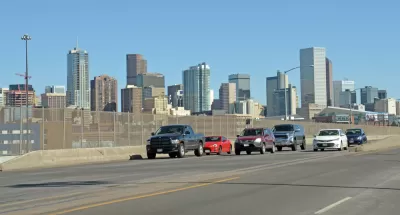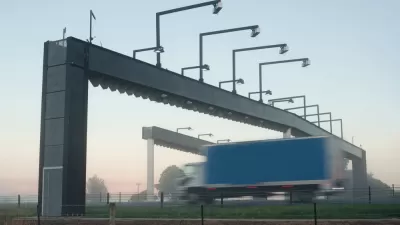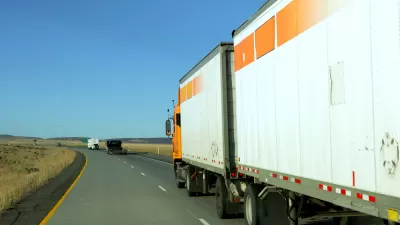Most of the 150 volunteers who participated in the 4-month program were pleased. Simulated invoices charged for vehicle-miles traveled after gas taxes paid were credited. Three technologies, including one with GPS, were available to record mileage.

"Several issues emerged from the broadly positive results, including privacy concerns stemming from the program’s use of GPS, the challenge of collecting revenue from out-of-state motorists traveling through Colorado and the appearance of punishing drivers of electric or fuel-sipping vehicles," reports John Aguilar for The Denver Post on Dec. 12.
In order to get closer to making a pitch for implementation, we have to answer more questions,” said Tim Kirby, a planning manager with the Colorado Department of Transportation. “We’re at the beginning stages of research.”
The final report, released by CDOT on Dec. 12, is available with separate links for the executive summary, fact sheet, and other documents on the Road Usage Charge (RUC) homepage. The pilot began in December 2016 and ran through April of this year.
The good news is that the initial feedback from the study was generally positive
"It comes closest to having the people who are actively impacting the system compensating for that use,” said Kathy Gilliland, a Greeley resident and pilot program participant who reported her mileage to CDOT using a GPS-enabled device plugged into her 1999 Toyota Camry. “It was outstanding — you plugged it in and just forgot about it.”
Participants could also opt for a dongle without GPS to plug into their onboard diagnostic (OBD) system, or opt to "snap a picture of their odometer and submit it online," as The Denver Post's editor, Chuck Plunkett, did. "The Tinfoil Hat Solution worked like a dream, but it was work," wrote Plunket on Dec. 15. "The other two versions did most of the work for you."
CDOT launched the program to investigate a sustainable source of road funding. The 22-cents per gallon state gas tax, unchanged since 1991, is not adjusted for inflation, unlike many state gas taxes. As vehicle fuel efficiency increases due to increasing fuel economy and emission standards, and sales of electric vehicles (EVs) that pay no or little gas taxes, increase as expected in the future, many state departments of transportation foresee huge revenue shortfalls.
“We’re looking at our revenue situation, and we’re falling off a cliff," said CDOT's Kirby.
CDOT estimates that it will see a $1 billion-a-year budgetary shortfall for the next 10 years, largely because an expected decline in gas taxes.
"Our nation’s system for funding its roads is dumb and only getting dumber," opined Plunket.
"Our maddeningly stubborn reliance on a tired old gasoline tax is failing and can’t be fixed. Embrace the RUC."
Also released this month was the final report for the 9-month California Road Charge Pilot Program involving 5,000 participants. Unlike the CDOT program, the pilot resulted from legislation. Next steps include investigating revenue collection using point-of-sale technology at gas pumps and EV chargers.
Hat tip to American Road & Transportation Builders Association (ARTBA).

Alabama: Trump Terminates Settlements for Black Communities Harmed By Raw Sewage
Trump deemed the landmark civil rights agreement “illegal DEI and environmental justice policy.”

Study: Maui’s Plan to Convert Vacation Rentals to Long-Term Housing Could Cause Nearly $1 Billion Economic Loss
The plan would reduce visitor accommodation by 25% resulting in 1,900 jobs lost.

Planetizen Federal Action Tracker
A weekly monitor of how Trump’s orders and actions are impacting planners and planning in America.

Wind Energy on the Rise Despite Federal Policy Reversal
The Trump administration is revoking federal support for renewable energy, but demand for new projects continues unabated.

Passengers Flock to Caltrain After Electrification
The new electric trains are running faster and more reliably, leading to strong ridership growth on the Bay Area rail system.

Texas Churches Rally Behind ‘Yes in God’s Back Yard’ Legislation
Religious leaders want the state to reduce zoning regulations to streamline leasing church-owned land to housing developers.
Urban Design for Planners 1: Software Tools
This six-course series explores essential urban design concepts using open source software and equips planners with the tools they need to participate fully in the urban design process.
Planning for Universal Design
Learn the tools for implementing Universal Design in planning regulations.
Caltrans
Smith Gee Studio
Institute for Housing and Urban Development Studies (IHS)
City of Grandview
Harvard GSD Executive Education
Toledo-Lucas County Plan Commissions
Salt Lake City
NYU Wagner Graduate School of Public Service




























